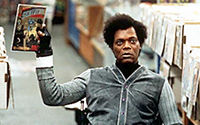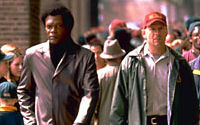

The
Frailty of Humanity
by Matthew Brown
![]()
_________________________________________________________________
M. Night Shyamalan's directing seems to be an open box, filled to the
brim with certain blockbusters. Unbreakable does not meet the expectations
held for it standing next to Signs and The Sixth Sense.
Still, this director shows that his movies are geared to an intelligent
audience, as he interlaces each with a hidden message. Unbreakable
is based on the idea that comic books were once a depiction of reality,
and that superheroes truly do exist. More importantly, digging deep within
the movie, Unbreakable is a story based on the frailty of humanity.
It is shown in the physical imperfections of humanity, the instability
of family, and the distrust in fellow man.
The human body represents the decay of flesh, broken bones, and losing the ability to function in day-to-day life. Elijah Price, played by Samuel L. Jackson, is the embodiment of human frailty in this movie. Born with broken arms and legs, he was born with a disease that kept his bones so brittle that any rough contact risked breaking his bones. Named "Mr. Glass" by the local kids because his bones break all the time, he loves comic books and has the idea that there could be someone on the other end of the spectrum from him. However, as we watch, we see that even the "superhero of humans" has a weakness. Humans get injured, get sick, age, and die.
Shyamalan
also explores the modern plague of a broken home. In the film, we see
a married couple going through rocky times, and heading for divorce. Married
with a son, the father David Dunn (played by Bruce Willis) still decides
to move to New York. The son is torn between the two and sleeps in different
rooms nightly to spend time with the different parents. The father walks
around aimlessly in the house, totally oblivious to his son and wife.
His child takes Elijah's words to heart, and pulls a gun on his father.
Prepared to shoot his own father to prove to the world that his father
is a superhero, he only backs down due to threats of his father moving
to New York. Throughout the movie, we see the married couple grow back
together, and begin to work things out. While it had significance in the
movie, its primary role was to show the instability of a happy home.
The last aspect of man's frailty, and the climax of the movie, lies in
the lack of trust in fellow man. When Elijah originally approaches David
Dunn, David's distrust shows when he walks away and says that he was waiting
for the line "all I need is your credit card number." This was
insinuating that he had no trust in people, assuming everyone is out looking
for easy money through scams. It takes the innocence of a child to trust
Elijah, which is taken away when the son almost shoots his father. Later,
we see Dunn in the middle of a public subway, attempting to use his newfound
ability of vision by touching people. At this point, he has learned to
trust Elijah, but no one else. He sees a vision of a large man at a stranger's
house. When the stranger opens the door, he kills the man to steal his
house, while holding his family hostage for days. Scenes like this have
become far more possible with time, giving people unease in trusting their
fellow man.
M. Knight Shyamalan's use of direct correlations between comic books and
humanity shows his belief that it may be true. These correlations are
highly interlaced with hidden meanings. We see the message of human frailty
in Unbreakable, the physical imperfections of man, the instability
of family life, and the decay of faith in other humans. He did this to
leave the viewers with an open mind…because comics are real?